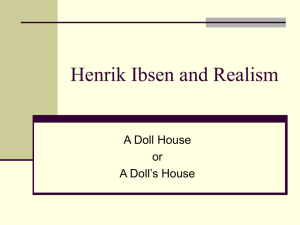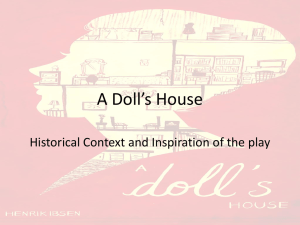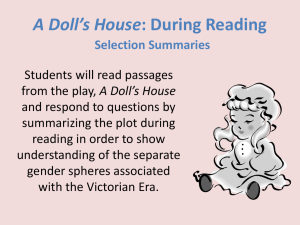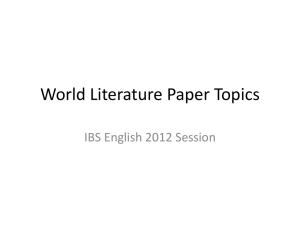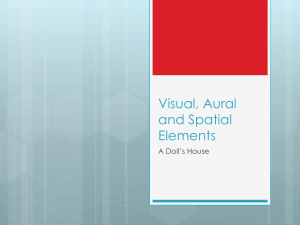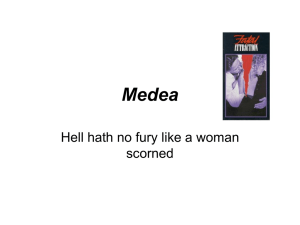MLA sample essay template
advertisement
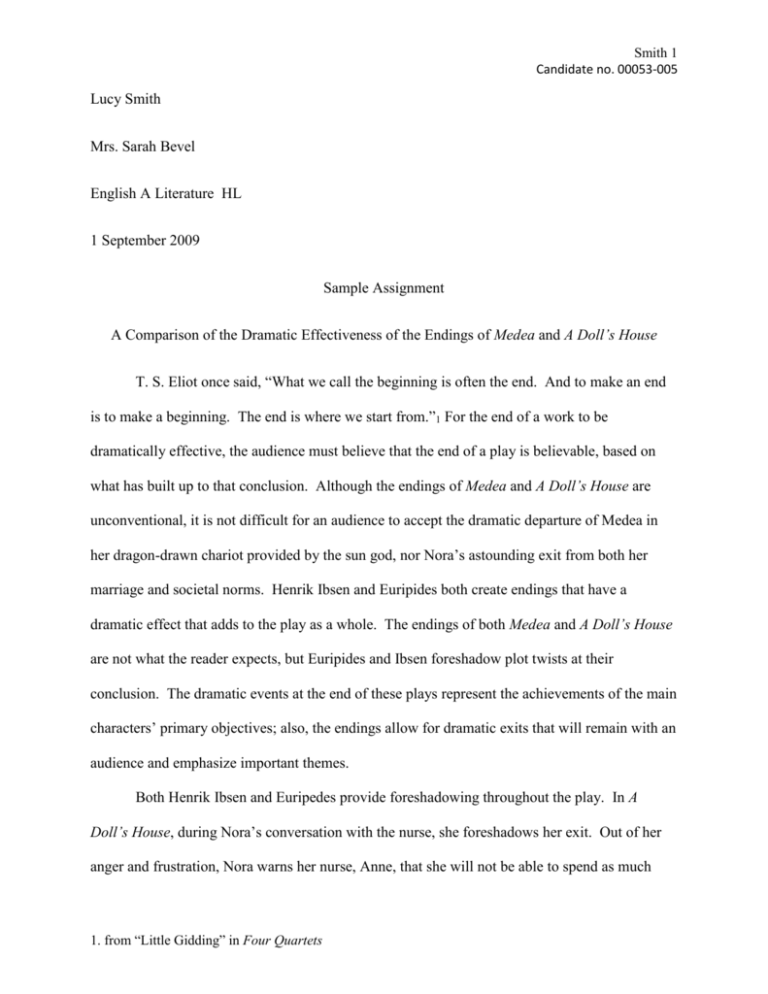
Smith 1 Candidate no. 00053-005 Lucy Smith Mrs. Sarah Bevel English A Literature HL 1 September 2009 Sample Assignment A Comparison of the Dramatic Effectiveness of the Endings of Medea and A Doll’s House T. S. Eliot once said, “What we call the beginning is often the end. And to make an end is to make a beginning. The end is where we start from.”1 For the end of a work to be dramatically effective, the audience must believe that the end of a play is believable, based on what has built up to that conclusion. Although the endings of Medea and A Doll’s House are unconventional, it is not difficult for an audience to accept the dramatic departure of Medea in her dragon-drawn chariot provided by the sun god, nor Nora’s astounding exit from both her marriage and societal norms. Henrik Ibsen and Euripides both create endings that have a dramatic effect that adds to the play as a whole. The endings of both Medea and A Doll’s House are not what the reader expects, but Euripides and Ibsen foreshadow plot twists at their conclusion. The dramatic events at the end of these plays represent the achievements of the main characters’ primary objectives; also, the endings allow for dramatic exits that will remain with an audience and emphasize important themes. Both Henrik Ibsen and Euripedes provide foreshadowing throughout the play. In A Doll’s House, during Nora’s conversation with the nurse, she foreshadows her exit. Out of her anger and frustration, Nora warns her nurse, Anne, that she will not be able to spend as much 1. from “Little Gidding” in Four Quartets Patriot 2 time with her children as she has in the past. Then, she asks, “Do you think they would forget their mother if she went away altogether?” (Ibsen 30). During this conversation, Nora points out that the nurse was a good mother to her while she had no true mother, and by intimating that her own children might be without her, she also hints at her dramatic exit at the end of the play. Torvald unknowingly indicates the dramatic ending himself when he drags Nora home from the Boxing Day costume ball. Obsessed with appearances, he insists that Nora leave the party: “An exit ought always to be effective, Mrs. Linde; but that is what I cannot make Nora understand” (Ibsen 56). By the end of the play, Torvald himself will stand reeling from Nora’s effective exit, leaving him without a clue as to the change in her character. Nora, by the end of the play, is tired of being treated like a doll and leaves Torvald to “think things over for [herself] and get to understand them” (Ibsen 68). She will leave her children behind and give her attention to her most sacred duty, which she describes as “duties to myself” (Ibsen 68). This departure is also foreshadowed by costuming in A Doll’s House. After Nora and Torvald return from the costume party, Nora changes from her tarantella costume to street clothes. Nora tells Torvald that she is “taking off [her] fancy dress,” and then Ibsen notes that she re-enters the room wearing “everyday dress” (64 – 65). This symbolizes and foreshadows the change that is to occur by the end of the play. In her everyday dress, Nora can confront Torvald and be an independent person rather than the doll that he has controlled since their marriage. Furthermore, Dr. Rank predicted this costume change when he visited the Helmers for the final time. He explained that Nora could go to next year’s costume ball dressed as “good fairy . . . just as she is in everyday life” (Ibsen 59). Patriot 3 In Medea, Euripedes also provides foreshadowing of the dramatic ending. Medea’s nurse understands that she has been wronged by Jason and will avenge this injustice. She warns the tutor not to allow the children to be in her presence: “. . . don’t bring them near their mother in her angry mood” (Euripedes 4). This foreshadows the evil that Medea will exert on her children at the end of the play, killing them with her own hand out of rage and anger towards her husband. Medea also says many things herself that foreshadow the ending of the play; for example, she warns Jason that “you will make the kind of marriage that you will regret” (Euripedes 20). When she bargains with Aegeus to give her a safe haven in return for helping him to have children of his own, her plan begins to take shape. This suggests that her actions will be so heinous that she will need protection from both man and the gods themselves, and she convinces Aegeus to promise her that he will “never cast [her] from [his] land” nor will he “willingly hand [her] over” to her enemies. The endings of both Medea and A Doll’s House, show the characters main objectives and also the power they have. By the end of A Doll’s House, Nora realizes that her main objective is to educate herself; her “sacred duty” is not to her husband and her children, but first and foremost, to herself. She first realizes that she needs to act as the adult she is and stop acting as Torvald’s little skylark. In fact, the conversation between Nora and her husband at the end of the play is a groundbreaking one: NORA. (after a short silence) Isn’t there one thing that strikes you as strange in our sitting here like this? HELMER. What is that? Patriot 4 NORA. We have been married now eight years. Does it not occur to you that this is the first time we two, you and I, husband and wife, have had a serious conversation? HELMER. What do you mean by serious? NORA. In all these eight years – longer than that – from the very beginning of our acquaintance, we have never exchanged a word on any serious subject. (66) Nora has realized that she, as a woman, has a mind of her own and that she can make decisions and does not need Torvald to always shelter her from the world. As important as her children were to her throughout the play, she does not balk when she is told by Torvald that she is inadequate to continue to raise them. Surprisingly, Nora agrees that she must learn more about herself before she can raise her own children. By the end of Euripedes’ play, Medea is able to exact revenge on her husband and hurt him the way he has hurt her. Just as Nora is able to realize that her “sacred duty” is to herself, rather than to her husband and children, Medea realizes that in order to avenge Jason, she must make him suffer the way he has made her suffer. During Medea’s conversation with Aegeus, she recognizes the importance of children to a man. Aegeus has traveled far to seek the help of the ancient oracle so that he can have children. Without them, he feels incomplete, so she realizes that to hurt her husband in the worst possible way, she will take away the children he has, as well as his new wife, thus preventing him from producing more children. When he discovers his children dead, he calls Medea a “hateful thing” and a “woman most utterly loathed” as he realizes that she has “left [him] childless” (Euripedes 43). Medea has found the power to make Jason suffer for his marriage to the princess. Now, he feels as utterly alone as she did at the opening of the play. Furthermore, she refuses to give him the bodies of his son to bury and Patriot 5 mourn, instead she insists that she will take them “to Hera’s temple on the promontory / So that no enemy may evilly treat them / By tearing up their grave” (Euripedes 45). In the end, it is Medea who triumphs over Jason, even though her victory comes at a great cost to herself. Nora’s dramatic exit allows her to leave the doll house so that she can be the person she needs and wants to be. Medea exits in a dragon-drawn chariot with the bodies of her children, knowing that she has found a way to make Jason see “the bitter end of [her] love” (Euripides 45). To truly hurt Jason, she must kill her children; while she is hurting her husband by killing her children, she is also hurting herself, but the hatred for her husband’s actions is her foremost concern. Because of the horrible nature of her crime, she must escape in a chariot drawn by dragons, provided for her by her grandfather, Helius. In this way she can find refuge as promised to her by Aegeus, knowing that she is safe and that her revenge is complete. In both plays, Medea and A Doll’s House, the authors use foreshadowing to give hints to the reader of what will happen by the end of the play. The dramatic events at the end of the plays show the achievements of the main characters. Medea’s escape on the chariot and Nora’s exit from her home demonstrate dramatic endings that the audience has been prepared for from the outset of the play. Word count: 1500 Works Cited Euripedes. Medea. New York: Dover Publications, 1993. Trans. Rex Warner. Print. Ibsen, Henrik. A Doll’s House. New York: Dover Publications, 1992. Print.

